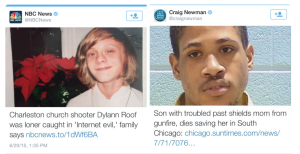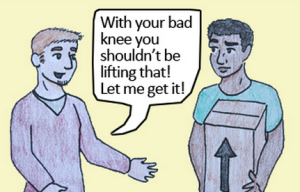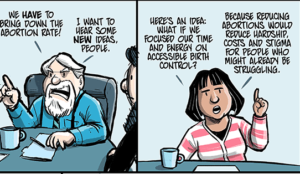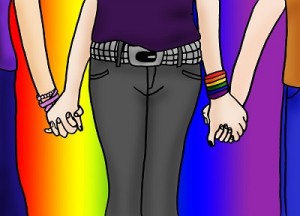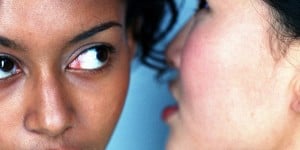Editor’s note: This article uses the word “women” to refer to anyone capable of giving birth. Please note that some people who do not identify as women also carry out pregnancies, and may also experience postpartum depression.

Source: Getty Images
Originally published on The Unexpected Project and cross-posted here with their permission.
Dear ones,
It doesn’t get much harder than this, does it? There was nothing to prepare you for it, and undoubtedly those who tried didn’t do a very good job, or avoided the truth.
You didn’t see it coming, and have been rocked to the core.
I think the sense of confusion and isolation is so distressing. Not knowing what is happening and not having it addressed by care providers can add insult to injury.
For the life of me, I don’t know why it is so difficult for those who should know better to help us not suffer. I also know that despite it, women with PMADs persevere with grit and guts only the strongest of strong know.
Women who experience depression or anxiety during or after childbirth didn’t sign up for it, but have in their bones a power unsurpassed by most. ‘Tis true!
I know in my heart that they are made of the stuff that great leaders envy.
Against all odds, and in the face of stigma, families that don’t understand, and providers who fail to ask, treat, or acknowledge symptoms, they fight.
Even when you are not aware of it, you are fighting. Even when you allow yourself to tell your scariest truths about your scariest thoughts, you are fighting. When you make the call, make the appointment, walk into the emergency room, check into the hospital, finally take medication, reach a support group, read or write a post, you are courageously laying down everything you have known to be true and real and good in the world.
And that is strength born from love.
I know this from the countless women I have met and meet. I know this from the years of research and learning I have done, and I know this from my own experience of PPD.
We birth a strength we never knew was possible from the most direct experience of love we will ever know.
I remember the faces of people staring at me, eight months pregnant waiting to see my shrink at the UCLA Neuropsychiatric Hospital.
See, I had been through one battle with PPD that nearly took me out. Dark, dark days. And I was not doing that again. So there I was, in my Target maternity clothes, waddling up to the receptionist, the pharmacist, the OB/GYN, the family practitioner, the labor and delivery nurse, and saying, “I am getting help and giving you all the judgment, ignorance, and stigma you want. Enjoy it. Yes, I am a big crazy pregnant lady. Think what you want. I am getting help.”
We give it all up right there in that one moment when we reach out for help.
We have the guts to give up how we thought our lives were going to be, to stay alive for the greatest love we have and will ever know, our children.
Defiantly, we reach in our pockets and take out every last cent of ourselves, turning our pockets inside out to prove to those who need it, that we really have nothing left. Really.
We hand over our bodies, our brains, relationships, and fantasies of motherhood, and we ask for – no, we demand – help.
And we get better.
We get ourselves out of the hole so that our children will remain whole. Because if they lost us, they would never be okay.
I am twelve years out now, but I remember.
And while I still battle depression demons, PPD taught me how to fight.
So when they come – and they do – I say, bring it. Let’s party, Depression, because I have been through hell and back, and I know how to roll with you old-school. Okay? Hell hath no fury like a mother who has had PPD.
And, dear Depression, I would be delighted to go ninja on your ass any time at all.
You know it, too.
You know that you have been through hell and back and have lived to tell the tale.
Rock on.
[do_widget id=”text-101″]
Walker Karraa, PhDc is a doctoral candidate at Sofia University, where she is finishing her dissertation study of the transformational dimensions of postpartum depression. Walker was the founding President of PATTCh, an organization founded by Penny Simkin dedicated to the prevention and treatment of traumatic childbirth. Walker is the perinatal mental health contributor for Lamaze International’s Science and Sensibility, Giving Birth With Confidence, and the American College of Nurse-Midwives (ACNM) Midwives Connection. She is co-authoring a book with Kathleen Kendall-Tackett, Ph.D., IBCLC, FAPA on PTSD following childbirth. Walker is a 10 year breast cancer survivor, and lives in Sherman Oaks, CA with her two children and husband.
Search our 3000+ articles!
Read our articles about:
Our online racial justice training
Used by hundreds of universities, non-profits, and businesses.
Click to learn more










